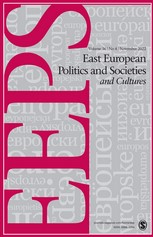The Great Terror in 1930s Kharkiv: The Case of Konrad Weisselberg and Anna Mykalo
The Great Terror in 1930s Kharkiv: The Case of Konrad Weisselberg and Anna Mykalo
Author(s): Irena Grudzinska Gross, Katarzyna Kwiatkowska-MoskalewiczSubject(s): Political history, Social history, Interwar Period (1920 - 1939), History of Communism
Published by: SAGE Publications Ltd
Keywords: Kharkiv; Great Terror; Stalin; UPTI; Jewish communists;
Summary/Abstract: The article presents the fate of Konrad Weisselberg (1905–37) and his wife Anna (Galia) Mykalo (1914–89), shedding light on the intensification of violence in Kharkiv in the 1930s and on the mechanisms of the Great Terror. Weisselberg was a chemist, an Austrian communist of Jewish origin, an ideological immigrant to the USSR, and a little-known victim of Stalin’s purges. Anna Mykalo was a peasant worker who moved to Kharkiv just before the Stalinist regime locked peasants in the countryside. The couple was associated with the Ukrainian Institute of Physics and Technology (UPTI), where prominent physicists—Soviet and foreign—worked in the 1930s. Their story is linked to post-revolutionary Kharkiv, a city of industrial utopia and the site of the Great Famine and the Great Terror.
Journal: East European Politics and Societies
- Issue Year: 39/2025
- Issue No: 01
- Page Range: 80-99
- Page Count: 20
- Language: English
- Content File-PDF

